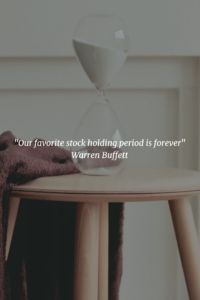In previous articles I have shared my opinion on Stock Picking Rules to Follow and The Basics of Investing. I have also shared with readers in a guest post why I think Chasing Yield is Fraught with Risk.
In this post I share my reasons for choosing to have a long-term outlook when it comes to equity investing.
Highly Effective
Investing with a long-term outlook has been demonstrated to generate meaningful long-term wealth creation.
Follow Warren Buffett and Charlie Munger to see their approach to investing and you will see they typically buy and hold. The list of Berkshire Hathaway (NYSE: BRK-a and BRK-b) subsidiaries starting on page 114 in the December 31, 2017 10-K reflects companies which have been held by BRK for years.
My Crystal Ball is Broken
Unlike pundits on investment news channels who come across as knowing in which direction stock prices are headed, I am unable to accurately forecast the direction of stock prices over the short-term. As a result, I have specifically decided to focus on investing in companies with sustainable competitive advantages, solid management, and strong financials and to simply buy and hold.
“In reality, no one knows what the market will do; trying to predict it is a waste of time, and investing based upon that prediction is a speculative undertaking.”
Seth Klarman
“We ignore outlooks and forecasts… we’re lousy at it and we admit it … everyone else is lousy too, but most people won’t admit it.”
Martin Whitman
“It is remarkable how much long-term advantage people like us have gotten by trying to be consistently not stupid, instead of trying to be very intelligent.”
Charlie Munger
Think Like a Business Owner
Thinking like a business owner allows you to approach investing from the perspective that companies are not merely ticker symbols that flash across a screen. Businesses:
- employ people who in turn spend money to fuel the economy;
- pay corporate taxes which, theoretically, should be applied toward the greater good of the economy;
- are typically in the business of trying to satisfy client needs;
- are endeavoring to generate returns for shareholders.
A typical successful business owner generally does not create and operate a business with the intent of being able to flip it in the short-term. A successful business owner will have a roadmap for the company which stretches well into the future.
“If you can remember that stocks aren’t pieces of paper that gyrate all the time –they are fractional interests in businesses — it all makes sense.”
Seth Klarman
“Behind every stock is a company. Find out what it is doing.”
Peter Lynch
Minimize Transaction Costs
Even though self-directed investment service fees have dropped dramatically over the years, active trading still triggers fees. Depending on the level of trading activity, these fees can significantly erode investment returns.
If you are paying an advisor to manage your investments you should very closely monitor the value you are receiving as these fees can seriously erode your investment returns. I strongly recommend you read a guest article I wrote entitled ‘Using Financial Advisors: A Cautionary Tale’.
Minimize Taxes
Taxes should not be the sole basis upon which an investment decision is made. It should, however, be one of the factors taken into consideration when making an investment decision.
As a result of the low interest rate environment we have experienced over several years, many investors have gravitated to specific equity investments solely on the basis of dividend yield. The distribution of high dividends, however, is not always the most beneficial way of increasing shareholder value. Depending on the company’s growth opportunities, the retention of profits for the purpose of growing the business can yield greater long-term returns for shareholders.
Dividend income received in non-tax advantaged accounts will have tax implications. If an investor does not NEED the dividend income, investing in solid companies which distribute no dividends or which have a low dividend yield should be considered.
Another tax minimization strategy involves investing in companies and just holding the investment (‘buy and hold’ and NOT ‘buy and forget’). In this case, as an investment increases in value there is no immediate tax implication.
The type of investment and the account in which an investment is held will also have an impact on that investment’s after-tax return. If you are a Canadian investor and you hold US equities or American Deposit Receipts (ADRs) in a non-registered account, you will face a withholding tax on the dividends disbursed to you.
If, for example, you are a Canadian citizen and hold 3M (NYSE: MMM) shares in a non-registered account, you will receive USD $1.156/share/quarter which is the USD $1.36 quarterly dividend less the 15% withholding tax. Had these shares been held in a registered account you would have received the full USD $1.36. While this may seem immaterial, I can assure you it becomes increasingly relevant if you own a few thousand shares.
Monitoring
The ability for an active trader to plan activities during the course of the week on the spur of the moment is restricted since active trading requires the constant monitoring of investments. A day trader is continually glued to their computer monitor during the trading day.
“The individual investor should act consistently as an investor and not as a speculator.”
Benjamin Graham
“If investing is entertaining, if you’re having fun, you’re probably not making any money. Good investing is boring.”
George Soros
The need to continually monitor investments negatively impacts the ability to make the most efficient use TIME…of one of your most precious assets.
Stuff Happens
While some retail investors revel in the thrill of the hunt and excel in active trading, this model is fraught with risk. If something were to happen to the active retail investor which resulted in a temporary or permanent inability to carry on, the investments could be exposed to significant risk and, in particular, if they are volatile and/or speculative in nature.
Imagine a scenario in which a retail investor invests in speculative investments. One day, an unexpected health issue arises and the retail investor’s family members are forced to step in to manage the investments (after they go through their grieving period). Unless these family members are at least equally proficient as the active trader, the portfolio is exposed to inordinate risk.
The strategy I have chosen to follow requires little involvement on my part. If something were to happen to me, the companies in which we have invested are likely to continue to thrive and to continue to disburse dividends to my beneficiaries. In all likelihood, my beneficiaries would not need to take any immediate action with any of our investments.
Patience
When you invest in a decent company with the view of holding your investment over the long-term you are less likely to make a knee jerk reaction when negative news is released.
Investors with a short-term investment outlook, or those who are inclined to invest in speculative investments, likely do not have luxury of being able to be patient with their investments.
“Over the long term, despite significant drops from time to time, stocks (especially an intelligently selected stock portfolio) will be one of your best investment options. The trick is to GET to the long term. Think in terms of 5 years, 10 years and longer. Do your planning and asset allocation ahead of time. Choose a portion of your assets to invest in the stock market – and stick with it! Yes, the bad times will come, but over the truly long term, the good times will win out – and I hope the lessons from 2008 will help get you there to enjoy them.”
Joel Greenblatt
Knowledge
As a long-term investor you are apt to spend more time learning about the industry, the company and its historical performance during different economic cycles, its future prospects and how it is adapting to changes impacting its customers and its industry, etc. This would include reading quarterly and annual reports and listening to presentations made by senior executives to members of the investment community in which they explain the direction in which the company is headed.
If you are inclined to makes investments without truly understanding a company you’re simply asking for trouble.
“Choosing individual stocks without any idea of what you’re looking for is like running through a dynamite factory with a burning match. You may live, but you’re still an idiot.”
Joel Greenblatt
Final Thoughts
Everyone has their personal reasons for investing but ultimately it boils down to making money to help you achieve your goals.
“One of my friends—a noted West Coast philosopher—maintains that a majority of life’s errors are caused by forgetting what one is really trying to do.”
Warren Buffett
The manner in which we invest will also differ. I suspect that most investors with a short-term mindset will be more inclined to actively trade and/or to invest in companies that are speculative in nature where there will be a greater degree in volatility in a company’s performance.
If you are willing to take the time to learn from some of the world’s most successful investors, however, you will likely learn that investing with a long-term outlook will most likely yield the best results.
“In the long run, it’s not just how much money you make that will determine your future prosperity. It’s how much of that money you put to work by saving it and investing it.”
Peter Lynch
A quote from Seth Klarman which resonates the most with me is….
Thanks for reading!
Note: I sincerely appreciate the time you took to read this article. Please send any feedback, corrections, or questions to charles@financialfreedomisajourney.com
Disclaimer: I have no knowledge of your individual circumstances and am not providing individualized advice or recommendations. I encourage you not to make any investment decision without conducting your own research and due diligence. You should also consult your financial advisor about your specific situation.
Disclosure: Long MMM and BRK-b.
I wrote this article myself and it expresses my own opinions. I am not receiving compensation for it and have no business relationship with any company whose stock is mentioned in this article.



